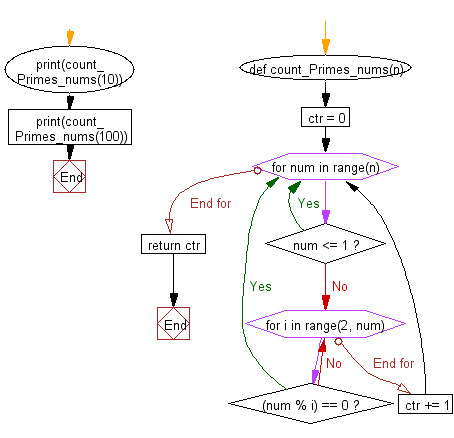Python: Count the number of prime numbers less than a given non-negative number
Prime Count Below n
Write a Python program that counts the number of prime numbers that are less than a given non-negative number.
Sample Solution:
Python Code:
# Function to count prime numbers up to a given limit 'n'
def count_Primes_nums(n):
ctr = 0 # Counter to store the number of prime numbers
# Iterate through numbers up to 'n'
for num in range(n):
if num <= 1: # Numbers less than or equal to 1 are not prime, so skip them
continue
# Check for factors in the range from 2 to num-1
for i in range(2, num):
if (num % i) == 0: # If num is divisible by i, it's not prime
break
else:
ctr += 1 # If no factors are found, increment the counter (num is prime)
return ctr # Return the count of prime numbers
# Print the count of prime numbers up to 10 and 100
print(count_Primes_nums(10))
print(count_Primes_nums(100))
Sample Output:
4 25
Explanation:
Here is a breakdown of the above Python code:
- First define a function named "count_Primes_nums()" that takes a limit 'n' as input.
- Initialize a counter 'ctr' to store the number of prime numbers.
- Use a for loop to iterate through numbers up to 'n'.
- Check if the current number is less than or equal to 1; if so, skip it since numbers less than or equal to 1 are not prime.
- Use another for loop to check for factors in the range from 2 to 'num-1'.
- If a factor is found, break out of the loop; otherwise, increment the counter 'ctr'.
- Return the final count of prime numbers.
- Print the count of prime numbers up to 10 and 100 using the function.
Visual Presentation:
Flowchart:

For more Practice: Solve these Related Problems:
- Write a Python program to count the number of prime numbers less than a given integer using the Sieve of Eratosthenes.
- Write a Python program to implement a prime counting function that returns the number of primes below n efficiently.
- Write a Python program to count primes below a specified value using a segmented sieve algorithm.
- Write a Python program to verify the count of prime numbers less than a given number using iterative methods and compare with sieve results.
Go to:
Previous: Write a Python program to find and print the first 10 happy numbers.
Next: Write a Python program to check if two given strings are isomorphic to each other or not.
Python Code Editor:
Have another way to solve this solution? Contribute your code (and comments) through Disqus.
What is the difficulty level of this exercise?
Test your Programming skills with w3resource's quiz.
